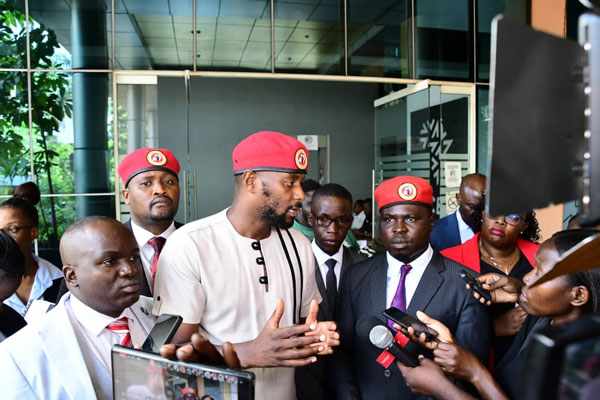
Kampala, Uganda | THE INDEPENDENT | The Constitutional Court has invalidated the parliamentary resolution to remove Francis Zaake, the Mityana Municipality Member of Parliament from his position as a Parliamentary Commissioner. In a majority decision with four Justices in favor and one in opposition, the Court ruled that the then Deputy Speaker Anita Among, who presided over the matter, had violated the principles of natural justice by not recusing herself as the complainant.
Justice Irene Mulyagonja, who delivered the lead judgment, stated, “The Deputy Speaker/Among ought to have resolved the question of her interest in the matter as soon as possible in the public interest as it is required by the Code of Conduct of Members of Parliament in the Rules. When she did not do so, she acted in conflict of interest and reflected that she was biased.”
The other members of the panel are Justices Eva Luswata, Oscar Kihika, Muzamiru Mutangula Kibeedi, and Catherine Bamugemereire, who dissented. The case originated from a successful petition by Zaake challenging the March 10, 2022, parliamentary resolution that removed him from the parliamentary commission for alleged indiscipline based on a report by the Rules, Discipline, and Privileges Committee chaired by Abdu Katuntu.
The committee had found Zaake in breach of public trust and parliamentary decorum. Zaake’s troubles began when he criticized the Speaker on social media for her comments during a plenary session honoring legislators and parliamentary staff who had participated in the East African Legislative Assembly Games in Tanzania. During the plenary, Anita joked that despite allegedly sustaining a broken leg following torture by security, Zaake had won a gold medal for Parliament in the 100-meter race.
Anita’s comments came at a time when legislators were complaining about the increasing cases of torture perpetrated by security agencies. Among directed the Committee to investigate Zaake following a motion by the Gulu City Barledge Division Member of parliament, Ojara Mapenduzi for his removal on allegations of abusing the Speaker using his social media handle. Dissatisfied with the impeachment resolution, Zaake petitioned the Constitutional Court, arguing that Parliament had not followed proper procedures and that members of the Rules Committee had received improper payments worth Shillings 6 million.
The Constitutional Court agreed with Zaake, stating that there was no quorum present when the resolution was passed, and the motion had been irregularly added to the order paper. Besides this, the Justices also noted Parliament breached its own rules of procedure, and more so, Among acted as a Judge in her own case. “The question then remains whether waiting for the Speaker who was at the time indisposed to return would have caused the Deputy Speaker or Parliament any prejudice. Definitely not, because the matter had already been investigated by the Committee on Privileges. Implementation of the recommendations as well as debate on the Motion ought to have been postponed until a person who had no personal interest in the matter was available to preside,” said the Justices.
The Court also criticized Deputy Speaker Among for not heeding advice from the Leader of the Opposition, Mathias Mpuuga, to postpone the proceedings until the Speaker, who had been indisposed, could return to preside over the matter. “He/Mpuuga drew attention to the fact that the petitioner was not in the House. He further advised that the House goes ahead to process the recommendations in the Report, lest Parliament be adjudged in the future to have failed to follow its own Rules of Procedure. He urged that Parliament consider and implement the recommendations in the Report of the Committee. The Deputy Speaker/Among did not respond to Hon Mpuuga’s impassioned plea,” the Justices ruled.
Adding that, “the Deputy Speaker acted as a judge in her own cause when she continued chairing Parliament in a matter in which she had a personal interest; the resultant proceedings contravened or were consistent with Articles 2 (ll and (21, 8A, 28, 42 and 44 (c) of the Constitution and were null and void…” However, the Court upheld the Privileges Committee’s report and recommended that Parliament proceed with its implementation.
“It has been established that the complaint referred to the Committee on Privileges was properly before them for they had the jurisdiction to deal with it. Further, when they passed and signed the report, the Committee had the requisite quorum that was required by the Rules of Procedure of Parliament for them to do so. The Report was therefore issued lawfully and cannot be quashed on the grounds raised by the petitioner,” said the Justices.
The Court clarified that there was no need for an injunction to halt the implementation of the resolution because it had already been invalidated. “Having quashed the Resolution, there is nothing left to implement, and therefore no injunction is due to the petitioner to stop implementation of the Resolution. However, the Report of the Committee against the petitioner and its recommendations still stand. I see no reason to issue an injunction to stop implementation of the recommendations therein,” Mulyagonja added.
The court awarded Zaake part of the costs for the case. Dissenting Justice Catherine Bamugemereire disagreed with the majority, asserting that Zaake lacked sufficient evidence to support his claims and that Parliament had validly suspended its own rules for the proceedings. Bamugemereire, who is the most Senior Judge on the panel went ahead to dismiss the application.
Francis Zaake, accompanied by several opposition legislators, welcomed the Court’s decision, praising it for upholding the rule of law and exposing issues within the parliamentary institution.
Elisha Bafirawara, the Assistant Director of Litigation and Advisory Services at Parliament, along with Moses Akena, the Principal Legal Counsel to Parliament, and Sam Tusubira, a State Attorney from the Attorney General’s chambers, said although they respect the court’s decision, they disagree with it. “We are going to study the judgment and exercise our right under the law. We don’t agree with the decision but we respect it,” Bafirawara told URN.
****
URN
 The Independent Uganda: You get the Truth we Pay the Price
The Independent Uganda: You get the Truth we Pay the Price

